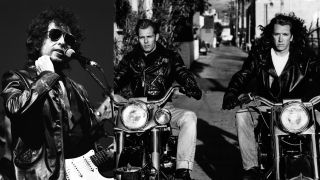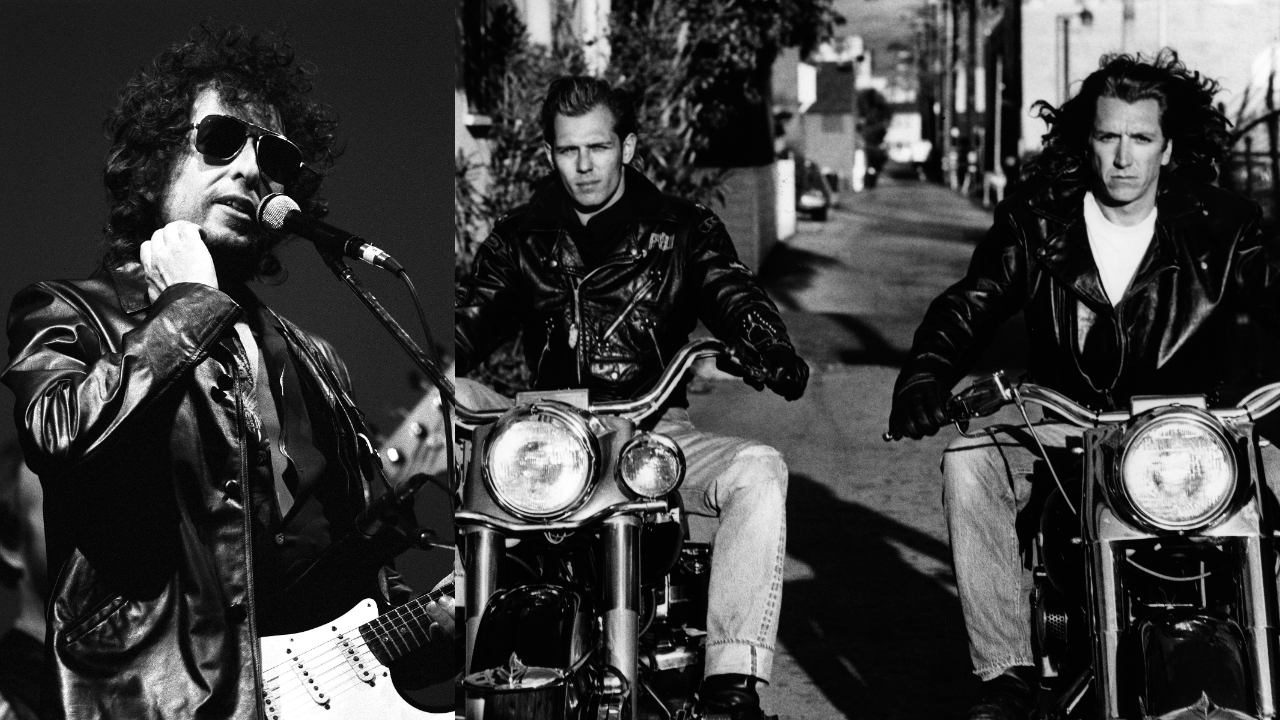“There was a bit of a clash of cultures.” The night that Hollywood star Mickey Rourke and a gang of bikers gatecrashed Bob Dylan’s recording session with members of The Clash and Sex Pistols

“It was a strange, fucking surreal day.”
This was former Sex Pistols guitarist Steve Jones‘ verdict on his one-time-only studio session with folk legend Bob Dylan and The Clash‘s Paul Simonon in the spring of 1987.
For reasons he never elected to explain, the folk legend had decided that his 25th studio album, Down In The Groove, would benefit from some outside input, and so, over the course of six years and numerous studio sessions, an extraordinary range of guest musicians – Eric Clapton, Ronnie Wood, Jerry Garcia, Mick Taylor, Mark Knopfler, and, er, Kip Winger among them – were invited to add light, shade and texture to the scattershot ten-song collection Dylan was assembling as the follow-up to 1986’s critically savaged Knocked Out Loaded album.
Exactly what motivated Dylan to place a call to Steve Jones and ask him to put together a band of his choosing for a March ’87 session at Sunset Sound studios – “maybe he was a secret Professionals fan,” the guitarist mused, with tongue firmly in cheek, in his highly readable 2016 memoir Lonely Boy – we shall likely never know, but to his credit, Jones took the assignment seriously, roping in the services of ex-Clash bassist Simonon, Pat Benatar’s drummer Myron Grombacher and longtime Rod Stewart collaborator Kevin Savigar, none of whom had the slightest idea what exactly Dylan expected of them.
Perhaps unsurprisingly, the ensuing session in Studio 3 was a stilted, awkward affair, not least because Dylan himself seemed unprepared, and unsure of what the common goal was, beyond directionless jamming.
“There was a bit of a clash of cultures,” Jones admitted in Lonely Boy. “He must’ve started about twenty different songs, then he’d cut them off just as we were getting going.”
Dylan-ologists believe that the make-shift group cut a total of six songs over the course of the evening, but only one, a cover of R&B tune Sally Sue Brown, originally recorded by June Alexander in 1960, would be deemed worthy of inclusion on Down In The Groove. Steve Jones couldn’t even remember what else may have been taped, telling Dylan biographer Howard Sounes that the evening was “basically just fucking about.”
His main recollection of the night, in fact, revolved around the arrival of some random uninvited guests, led by actor Mickey Rourke.
“Mickey Rourke turned up at the studio with a big gang of our biker mates,” Jones noted in Lonely Boy. “I was facing the glass window of the control room and Dylan was facing me, with his back to the entrance. While he’s talking away to me, i notice Mickey and about 30 of these other biker geezers come swaggering in. Then Bob turns round to see them all, and does a massive double take. I wish someone had been filming it, because his face was a picture.”
“I wouldn’t say he was intimidated, but it wasn’t long before he made his excuses and left.”
Listen to the collective’s take on Sally Sue Brown below:
For all its additional star power, Down In The Groove got even worse reviews than its predecessor when it emerged on May 30, 1988, with Rolling Stone stating: “Dylan fans will forever argue about the precise moment when [Dylan’s] career hit rock-bottom but most pin it somewhere around the time that Down in the Groove landed with a thud in record stores.”
You win some, you lose some.

